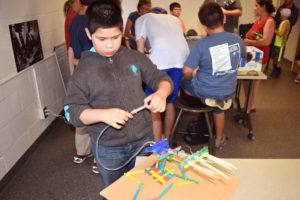
Photo: Margaret McKinney/Highlands University
Louie Sanchez, 11, of Las Vegas, New Mexico tests the hydraulic robot he built during a weeklong robotics camp for youth June 19 – 23 at Highlands University.
Las Vegas, N.M. – New Mexico Highlands University offers the only dedicated computer science maker space in the state where K-12 youth get hands-on experience creating their own projects from robots to exploring virtual reality, thanks to an investment from Los Alamos National Laboratory.
“Our new computer science classrooms for youth at Highlands are what’s called a fab lab, an exciting place to fabricate and test prototypes using high-tech machinery and tools like virtual reality, laser cutters, and 3-D printers,” said Mariano Ulibarri, LANL coordinator for computer science at Highlands. “With our summer camps we aim to generate enthusiasm with young people about the possibilities of computer science through active project based learning.”
At the university’s robotics camp June 19 – 23 for fifth through eighth-graders, the three computer classroom classes in Hewett Hall at Highlands buzzed with creative activity as students used technology to create their own robots.
“I’m interested in maybe being a mechanical engineer someday,” said Faith Lyon, 11, of the village of El Alcon, New Mexico. “The step-by-step process of building robots is exciting and it’s really fun to be here.”
In 2016, Los Alamos National Laboratory endowed Ulibarri’s position at Highlands within the university’s nationally recognized Achieving in Research, Math and Science Center (ARMAS). The partnership between Highlands and LANL aims to increase computer science graduates at Highlands that will eventually fill professional positions at the laboratory.
Carole Rutten, deputy director of LANL’s Community Partnership Office, said the the laboratory wants as many future computer science professionals as possible to come from northern New Mexico.
“We’re so thankful to partner with Highlands for more than 12 years and appreciate President Sam Minner’s active engagement with the laboratory on workforce development programs for K through 20 students,” Rutten said. “Mariano is an innovative leader who develops highly successful technology programs for youth. These new camps serve youth from San Miguel and Mora counties who wouldn’t otherwise have these opportunities.”
Rutten said LANL has a high need for computer science and information technology professionals.
“Locally, we have a network of youth who are hungry for this kind of computer science programming,” said Ulibarri, 36, a national leader in the maker space movement who earned earned his M.A. in media arts and computer science from Highlands in 2013.
A maker space is a do-it-yourself environment that brings people together to create, tinker and repair items using open-source computer hardware and software and other technology.
Ulibarri said in June when word spread informally about the computer science camps for youth at Highlands, the response was phenomenal, with registration filling within days.
“We are filled to capacity of 25 students each for our four camps: robotics for fifth through eighth- graders, 3-D printing and virtual reality for seventh through 12th-graders, and maker camps for kindergarten through second-graders and third through fifth-graders,” said Ulibarri, who created the popular Parachute Factory maker space in Las Vegas in 2012, the first in the state.
In August 2016, the White House invited Ulibarri to contribute to the Nation of Makers meeting. The Las Vegas, New Mexico native has taught computer science in K-12 and college settings.
Ulibarri is already planning after-school K-12 programming for youth for fall 2017 as well as work shops for schools. He will also mentor computer science students at Highlands early in their academic career.
For more information, contact Ulibarri at mmulibarri@nmhu.edu or 505-454-3003.
